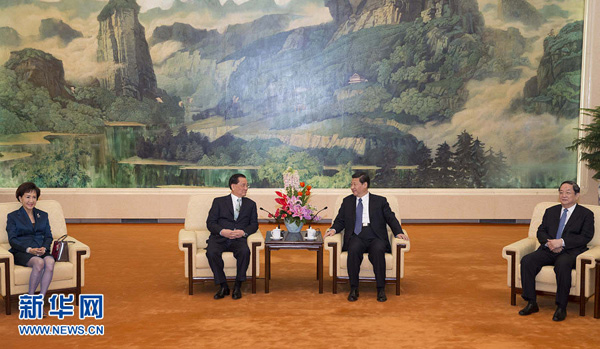Momentous meeting has positive meaning
(China Daily) Updated: 2015-11-05 08:02
 |
|
Xi Jinping, general secretary of the Communist Party of China Central Committee, meets with Lien Chan, honorary chairman of the KMT, at the Great Hall of the People in Beijing, Sept 1, 2015. Lien Chan was invited to attend the Sept 3 military parade marking the 70th anniversary of the WWII Victory over Japanese aggression, a victory won through the cooperation of the Communist Party of China and the Kuomintang in Chinese mainland. [Photo/Xinhua] |
They are meeting in the full capacity of official positions. But official titles will be carefully avoided: They will simply be "Mr Xi" and "Mr Ma" to each other.
They have chosen a third place to meet. They will sign no agreement, release no joint statement.
But that in no way undermines the historic, milestone significance of the very first meeting of leaders on both sides of the Taiwan Straits.
No wonder the announcement that Xi Jinping and Ma Ying-jeou will meet in Singapore on Saturday has caught so many by surprise.
That such a widely anticipated meeting, the window for which many believed had closed, is finally about to materialize is in itself worth celebrating.
For all parties that have a stake in stable cross-Straits relations, including those who prefer the 66-year divide to be sustained but want peace at the same time, this deserves congratulation. Even the wary White House has given its "welcome".
There is indeed nothing to fear about the meeting. As both sides have indicated, it is only about securing peace and affirming mutual goodwill.
At a time when cross-Straits ties have reached a crossroad, it is a blessing to people on both sides of the Straits that Xi and Ma have decided to talk face to face. Even without producing anything tangible, their meeting will send a powerful message of a common commitment to peace.
Given the pervasive misgivings the two sides have developed over the 66-year separation, they have a long way to go to build lasting mutual trust. Priority No 1 is to make sure the hard-won rapport accumulated over the past years does not evaporate overnight because of any political change.
The leadership on the mainland has once and again expressed willingness to talk with anyone who embraces the "1992 Consensus" that there is only one China, to which both Taiwan and the mainland are a part.
Their meeting is of far-reaching significance because it may pave the way for similar meetings in the future. At the very least, it will open up a precious new channel for managing cross-Straits relations.
That the two sides have managed to set up the meeting "at the right time and on the right occasion and in the right capacity" shows a shared sense of urgency to cement otherwise vulnerable cross-Straits ties.
It is evidence that Chinese people on both sides of the Straits have the wisdom and statesmanship to get their own things right.
- Taiwan voices high expectation for upcoming Xi-Ma meeting
- New digital map on dengue outbreaks in Taiwan launched
- Xi to meet Taiwan leader in Singapore
- Event showcases best of Taiwan's creations
- Mainland approves more Taiwan investment projects
- Official urges right path for mainland-Taiwan relations development











